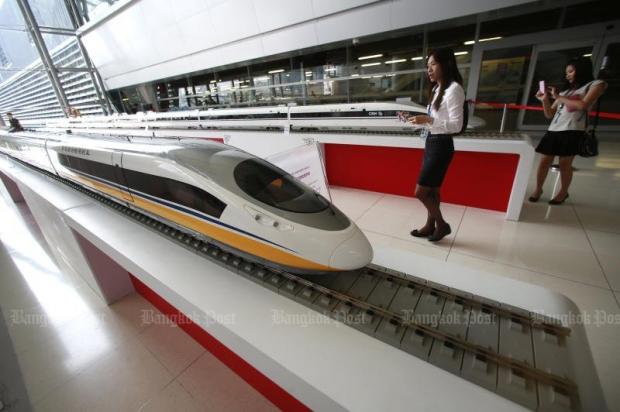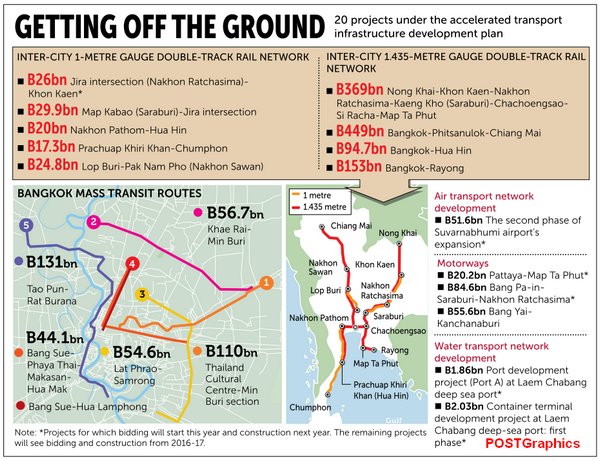
China has shown off its vision of high-speed train services, such as this exhibition at Makkasan station. (Photo by Thanarak Khunton)
The signing of a memorandum of cooperation (MoC) between Thailand and China on a new railway development project planned for tomorrow has been shelved after China failed to honour an associated agreement on rubber that was in the same package.
Transport Minister Arkhom Termpittayapaisith revealed Tuesday that Deputy Prime Minister Somkid Jatusripitak had put the brakes on the MoC signing until both sides come to a new agreement.
The project comprises two connecting railways, one from Bangkok to Nong Khai through Kaeng Khoi (in Saraburi province) and Nakhon Ratchasima and the other from Kaeng Khoi to Map Ta Phut (in Rayong province).
The two routes will together cover 867km and cost 350 billion baht, according to a draft framework for the Thai-Chinese rail deal revealed by the Thai government last month.
Construction will be divided into four sections — Bangkok-Kaeng Khoi; Kaeng Khoi-Map Ta Phut; Keang Khoi-Nakhon Ratchasima; and Nakhon Ratchasima-Nong Khai, according to the cabinet-approved framework.
The rail service is part of a 1.8 trillion baht transportation megaproject approved by the cabinet Tuesday (see graphic below). It is the biggest such megaproject in the nation’s history.
- Biggest megaproject ever: Cabinet approves 1.8 trillion baht plan
China previously asked to change a company that had been contracted to buy rubber from the Thai government and attached a new condition in which it would purchase only new rubber, said Mr Arkhom.
These changes arose despite the fact that China had initially agreed that it would buy from Thailand’s Mulaphan Kanchon rubber price intervention programme which includes both new and old rubber, he said.
Thailand had no choice but to postpone the MoC signing because the rail contract was initially designed to be in the same package with the rubber and rice trade deals, he said.
These three contracts will be put on hold until Thailand and China can find common ground on the rubber deal, he said.
As for another railway development deal that Thailand has recently reached with Japan, Mr Arkhom said the next process involves improving the condition of existing rail tracks, conducting trial runs for the train service, jointly investing in providing train services, and building double-track rail lines.
Thailand and Japan signed an MoC on a railway development project on Nov 26 in Japan.
The project deals mainly with the construction of a 547-kilometre rail route from Ban Phu Nam Ron on the border of the western province of Kanchanaburi to Sa Kaeo’s Aranyaprathet district in the east and is expected to start early next year.
A new railway will also be built linking Kanchanaburi and the planned deep-sea port in Dawei in Myanmar.
Source: http://www.bangkokpost.com/news/general/782121/somkid-shelves-rail-project-with-china


